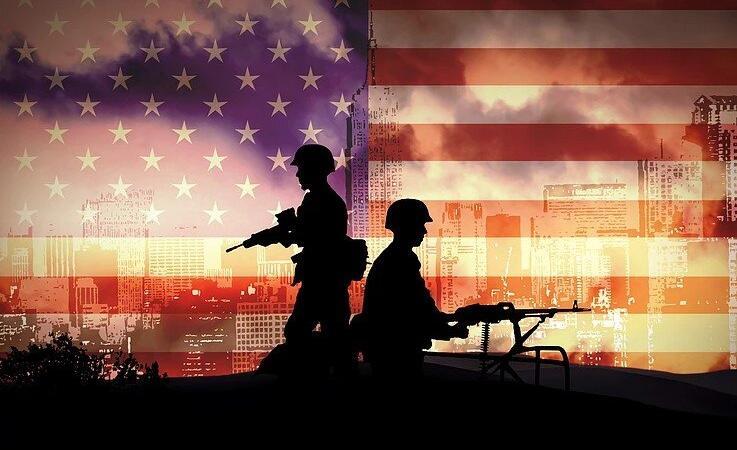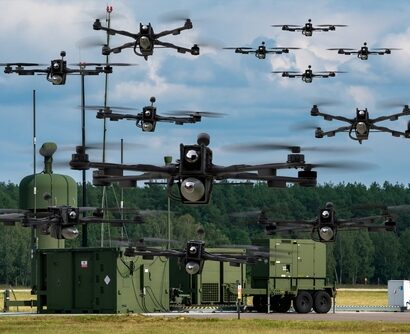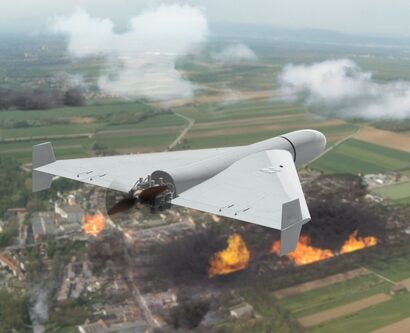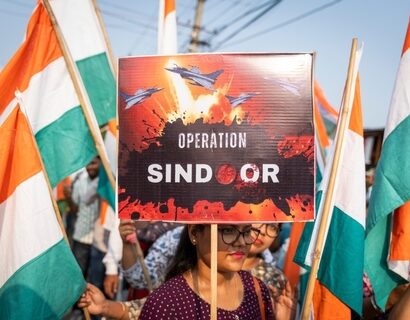Abstract: This work advocates a Poststructuralist view of global terrorism norms, broadly defined, highlighting the understated role of the United States in determining established conceptions of terror. It outlines the US strategy to globally diffuse a purposive representation of terror, which has conditioned international behaviour towards terrorism both in discourse and in practice. Furthermore, the great power has established its ‘War on Terror’ as an international norm in itself by promoting the global counterterrorism effort as a touchstone of state practice. Finally, it is demonstrated that the United States enforced a parochial interpretation of international law to authorise its military campaign against terrorist organisations which served to reshape international legal norms and standard counterterrorism practices.
Bottom-line-up-front: The evolution of international norms and the instrumental goals of great powers are by no means mutually exclusive. Rather, the United States’ prosecution of its War on Terror has demonstrated that great powers act as norm entrepreneurs to pursue their national interests, with considerable implications for the international order as a whole.
Problem statement: How to address a well-established overemphasis on the purported agency of terrorist actors in influencing international norms and state behaviour?
So what?: There is a need to deconstruct the globally accepted framework for understanding international terrorism, which accounts for the ways in which entrenched conceptions of ‘terror’ serve to reinforce the interests of the very norm entrepreneurs who actively shaped them.

Source: Shutterstock.com/Benjamin Haas
It has often been exclaimed that the Al-Qaeda (AQ) attacks on the United States of September 11 2001, radically transformed the architecture of the twenty-first century international order, and particularly the international norms—loosely defined as ‘broadly accepted standards of state behaviour’[1]—at its foundation. It is said that ‘no country could save itself from the heat coming out of the smoking rubble of the [World Trade] Center,’ precipitating inevitable normative consequences as states drastically adjusted their behaviour to contend with the formidable threat of international terrorism made abundantly clear by the events of 9/11.[2] However, it is likely such a view lends too much credence to the perpetrators of such terrorist acts in terms of their power to fundamentally impact the international order, while overlooking the essential role of great powers, acting as norm entrepreneurs for instrumental reasons, in the evolution of international norms.[3]
The United States has actively sought through the promotion of norm change to eradicate international terrorism and therefore eliminate the threat to its national security embodied by the 9/11 attacks.[4]
In other words, international terrorism has not so much represented a force for change in state behaviour in itself, but rather more importantly provided the United States with both the motivation and the leverage to exert its influence and set its own course for the future of international norms[5]—unmistakably expressed in its ‘War on Terror.’ The War on Terror is defined herein as the global counterterrorism campaign launched by the great power in response to the AQ attacks on American soil. This work argues that the United States directly promoted norm change to facilitate its prosecution of the War on Terror. This effort’s success has ultimately played a monumental role in shaping the norms that form the basis of the 9/11-era international order.
Practices of Representation in the Terrorism Discourse
Historically, there has been no lack of consensus among states that terrorism is reproachable to a considerable extent, not least for its characteristic aim of jeopardizing peace and security to undermine governments or state policies.[6] Yet, the practice was not always considered to be ‘illegal’ per se[7]; and it had long been accepted by many that certain terrorist acts should not be condemned as such, but rather afforded a certain aura of legitimacy, recognized as part and parcel of broader political struggles such as ‘people’s wars’ for national liberation against oppressive or colonial governments.[8]
The late R.R. Baxter, a preeminent figure on the law of war, epitomized the pre-9/11 era terrorism discourse in 1974, for instance: ‘I fight wars of self-defence. You fight imperialistic wars of aggression. I am a patriotic soldier. You are a war criminal. I am a freedom fighter. You are a terrorist. It is in language of this character that we carry on rational discourse in these days.’[9]
Evidently, representations of terror in the pre-9/11 terrorism discourse often acknowledged the legitimate grievances driving it.[10] Accordingly, many governments in the West appeared even sympathetic to the legitimacy claims of terrorist organizations: For instance, the political wing of the Palestinian group Hamas was notably allowed to operate freely in the European Union (EU) until late in 2003, despite its responsibility for countless acts of terror since its inception in the 1980s.[11] Similarly, despite decades of terrorist activity, the African National Congress (ANC) was designated a legal political party in 1990, and its leader Nelson Mandela conferred a Nobel Peace Prize before ascending to South Africa’s presidency in 1994, inter alia.[12]
In other words, it is clear that prior to the War on Terror, participants in terrorist acts and their claims to justice were often conferred some degree of legitimacy.
On the other hand, in confronting the challenge to its national security posed by global terror, significant normative change has been elicited by the United States regarding practices of representation in security discourses. In particular, the great power resolved to declare war on terror itself, the impact of which has proved monumental to the representation of terror in the established terrorism discourse. Take it from Post-Structuralist International Relations theory (PS), for instance. PS indicates that representation is dependent on ‘a selective likeness, a process by which certain aspects are emphasised while others are ignored.’[13] Through such a process, representation assumes an aspect of political utility for states seeking to bring about norm change by serving to alter discourses in favour of their political purposes.[14] The strategic logic of effecting change in practices of representation is therefore clear. Through this PS lens, it can be understood that the discursive formation of ‘War on Terror,’ as the conflict has been strategically branded, is likewise a powerful expedient itself for the United States’ effort to construct a novel discursive representation of terror that is favourable to its campaign against the terrorist threat.
As Upendra Baxi, a leading international legal scholar, has noted, ‘In itself, neither “war” nor “terror” constitutes any new phenomenon,’ yet ‘this rather voracious doublement functionale remains violently inaugural; never before September 11, 2001… were acts of “terror” described in terms of a “war,” nor were the practices of counter- “terror.”[15]
‘In itself, neither “war” nor “terror” constitutes any new phenomenon,’ yet ‘this rather voracious doublement functionale remains violently inaugural.
The significance of this declaration of ‘war’ on terror lies in that it ‘flattens historical time, reducing many histories of multiple terrorisms to a single date (that is, 9/11), summoning a singular reconstitution’ of the notion in global public memory, according to Baxi.[16]
To illustrate, President George W. Bush pressed home in a range of speeches between 2001 and 2004 that terror as a whole was, without exception, ‘lawless violence… against all humanity,’ ‘threatened civilization itself,’ and ‘could never be justified.’[17] Advancing such a generalization consequently ‘eliminates the need to distinguish between some other categories’ of terrorists by dismissing the possibility that some may have a legitimate cause, giving rise to a new international norm that automatically rejects the concerns of those engaging in terrorist activity and effectively expropriates the practice of any measure of legitimacy it may have previously been afforded.[18] Ultimately, this process of delegitimization fulfilled by the label ‘War on Terror’ serves the United States’ interests by establishing a black-and-white perspective of terrorism, which ‘provides absolute clarity as to which rival group’ is to be considered the enemy and accordingly facilitates the state’s efforts to institutionalise hostility towards them.[19]
Moreover, and most importantly, in marked deviation from the more receptive terrorism discourses of the past outlined above, this representation propounded by the Bush Administration attained global influence, demonstrating the United States’ success in diffusing its discursive formulation. This is significantly evident in Resolution 1566, adopted by the United Nations (UN) Security Council in October 2004, condemning ‘in the strongest terms all acts of terrorism irrespective of their motivation, whenever and by whomsoever committed, as one of the most serious threats to peace and security,’ and affirming that the practice is ‘under no circumstances justifiable.’[20] In other words, in prosecuting its War on Terror, the United States has strategically reshaped the established terrorism discourse to constitute a representation of terror devoid of nuance, which in its epistemic function reduces the notion to a single overarching adversary that is not just deplorable but unconditionally illegitimate. In doing so, the state has ultimately constructed a new international norm insofar as it has transformed the manner in which states in the international system perceive terrorism.
Internationalising the Crusade Against Terror
The further normative impact of the ‘War on Terror’ and particularly its creation of a unitary, delegitimized enemy out of terrorism extends beyond the abstract realm of discursive representation. Crucially, it transforms the struggle against terror as it is framed within the contemporary discourse from an internal security concern of a handful of states into one of a global, Manichean ethic, in which ‘the state system fights to defend itself’ from an enemy which transcends conventional national political and legal channels and threatens its very existence.[21]
So it follows that the United States promoted norm change by proselytizing a logic of appropriateness which holds participation in its crusade against terror as an international standard of acceptable state behaviour.
Such is epitomized in a 2002 statement by United States Under-Secretary of Defense Douglas Feith: I think that we may be on the way to creating a new international way of thinking, a new international norm, about terrorism. If you look at the national-security-strategy document that the White House put out, it says that our goal is to make terrorism like piracy, the slave trade, or genocide in the minds of people around the world.[22]
From this assertion, a critical insight becomes clear in light of its likening of terrorism to such practices as piracy and slavery, which were once accepted as legitimate political activities in the international system but were similarly rendered illegitimate and, in an international effort led by the great power, ultimately abolished.[23] This reveals the United States’ calculated effort to frame terror as requiring a collective, international response to expunge. President Bush further reinforced this message in a 2003 speech: ‘We must use the full influence of the United States to delegitimize terrorism and make clear that all acts of terrorism… all must oppose [emphasis added].’[24]
In other words, the United States promoted norm change by framing its crusade against terrorism as in the interests of all states. That the effort to establish this new international norm prevailed is exemplified by the widespread global proliferation of counterterrorism legislation following the United States’ declaration of War on Terror. Whereas pre-9/11, counterterrorism legislation was ‘relatively limited and predominantly focused in a few countries as a reaction to terrorist threats,’ according to Elena Pokalova, Professor of Security Studies at the US National Defense University, the number of states with some form of dedicated counterterrorism law increased from 31 in 2001 to 109 in 2014—leaving states without now in the minority.[25] This suggests that commitment to the global, US-led campaign against terror has been normalized within the international order, marking the great power’s clear success in enforcing norm change to propagate the War on Terror.
Reshaping International Legal Norms: Expanding the Right to Self-Defence
When elaborating on the means, rather than the ends of the United States’ prosecution of its War on Terror it turns out that to facilitate its prosecution of the War on Terror, the United States elicited a fundamental change in norms of international law regarding the interpretation of the inherent right to self-defense—provided by the UN Charter Article 51 as the only exception to the prohibition of the use of force under Article 2(4).[26] It is important to note that from at least 1945 until the advent of the War on Terror, international norms concerning the use of force ‘envisaged a right of self-defence applicable in inter-state relations only: by a victim state against the aggressor state.’[27] Naturally, the use of force in self-defense was traditionally viewed as unlawful against non-state actors.[28]
Yet, as constructivist International Relations theory tells us, ‘security discourses act as the very containers of legitimacy and possibility for some of the most powerful human emotions and actions’ including war and violence.[29] In this respect, it can be said that a tectonic normative shift brought about by the War on Terror and its discursive representation of terror has emerged out of the United States’ invocation of self-defense to authorize the unprecedented and overwhelming use of force it deemed necessary to combat non-state, terrorist actors.
Granted, the United States had indeed endeavored to quell terrorist activities with force on occasion since the 1970s; however, the state rarely resorted to doing so, with both the Reagan and Clinton administrations using force in response to terrorist events on only two occasions—despite more than 600 terrorist incidents occurring throughout the former’s presidency alone. [30]
This behaviour changed significantly as a product of the United States’ strategy in the War on Terror, which determined that ‘military means’ were required to stamp out terrorism[31]; and that accordingly the state would direct ‘every necessary weapon of war… to the defeat of the global terror network.’[32] Accordingly, the War on Terror witnessed ‘some extraordinary representations of massive, often “Star Wars type” military responses to terrorism[33]—from Predator drone strikes on suspected AQ operatives in Yemen and Pakistan, to full-fledged military invasions in Afghanistan in 2001 and Iraq in 2003.[34]
Most importantly, to justify the use of such force to carry out its War on Terror, the US turned the traditional understanding of the right to self-defence on its head by invoking the right to respond to aggression by non-state actors, underpinned by the claim that the terrorists had started a war against the United States.[35] Accordingly, it was widely recognised internationally that the United States and its allied coalitions indeed acted in self-defence against AQ in Afghanistan and Iraq. The US invasion of the latter even occurred with the UN’s blessing—articulated in Security Council Resolution 1368, which formally noted for the first time the right of states to respond to terror with force in accordance with Article 51 of the Charter.[36] In addition, states including the United Kingdom and France have, more recently, asserted in the same vein their right to self-defence to combat the ISIS in Syria.[37] This indicates that the United States’ redefinition of the inherent right to self-defence in the face of armed attack—in this case expanding its parameters to authorize military action against non-state, terrorist actors—has diffused internationally. Ergo, the US’s role in reshaping norms of international law to authorize the execution of the War on Terror is clear.
Conclusion
The evolution of international norms and the instrumental goals of great powers are by no means mutually exclusive.
Rather, the United States’ prosecution of its War on Terror has demonstrated that great powers act as norm entrepreneurs to pursue their national interests, with considerable implications for the international order as a whole.
Through a PS lens, it can be seen that the great power has propounded a representation of terrorism, which in its epistemic function has served to delegitimise the practice by discarding its legitimacy claims within the terrorism discourse; and resultantly transformed norms of representation governing international perceptions of terror. Moreover, by framing terror and its ‘War on Terror’ in terms of a binary ethic, the US has enforced norm change by classing active commitment to rooting out terrorism as a canon of state behaviour. Finally, to facilitate its execution of the War on Terror, the US promoted a purposive interpretation of the right to self-defence against terrorism, which has been enshrined in international law and accordingly reshaped the manner in which states respond to aggression by non-state actors.
Ultimately, while events as seemingly earth-shattering as those which unfolded on September 11, 2001, may influence state practices to some extent, it must not be overlooked that the most potent determinants of international order are often endogenous, just as the interests of great powers remain central factors in the evolution of international norms.
Olivia Minor is a final-year undergraduate student in the department of War Studies at King’s College London, with a keen interest in all things strategy. Her research centres on United States Grand Strategy and conceptions of world order, and their implications on a global scale. She is also a staunch defender of the Oxford comma. The views contained in this article are the author’s alone and do not represent the views of King’s College London.
[1] Ann Florini, “The Evolution of International Norms,” International Studies Quarterly 40, no.3 (1996): 365.
[2] Nausheen Wasi, “Global Security Environment after 9/11: Implications for South Asia,” Pakistan Horizon 56, no.4 (2003): 35, www.jstor.org/stable/41394390.
[3] Renee de Nevers, “Imposing International Norms: Great Powers and Norm Enforcement,” International Studies Review 9, no.1 (2007a): 56, www.jstor.org/stable/4621777.
[4] Idem.
[5] Wasi, “Global Security,” 38.
[6] Renee de Nevers, “Sovereignty and Ethical Argument in the Struggle against State Sponsors of Terrorism,” Journal of Military Ethics 6, no.1 (2007b): 4; and Michael W. Kometer, The New Terrorism: The Nature of the War on Terrorism, (Air University Press, 2004): 10.
[7] Kenneth Watkin, “Warriors Without Rights? Combatants, Unprivileged Belligerents, and the Struggle Over Legitimacy,” Program on Humanitarian Policy and Conflict Research (2005): 5.
[8] Watkin, ”Warriors without rights,” 5; and De Nevers, “Sovereignty,” 4.
[9] R. R. Baxter, “A Skeptical Look at the Concept of Terrorism,” Akron Law Review 7 (1974): p. 380; in Watkin, ”Warriors without rights,” 5.
[10] Kometer, The New Terrorism: 14.
[11] BBC News, “EU Blacklists Hamas Political Wing,” (11 September 2003), http://news.bbc.co.uk/1/hi/world/middle_east/3100518.stm.
[12] Michael Moran, “Terrorist Groups and Political Legitimacy,” (Council on Foreign Relations, 17 March 2006), https://www.cfr.org/backgrounder/terrorist-groups-and-political-legitimacy.
[13] Bas van Fraassen, Scientific Representation: Paradoxes of Perspective (Oxford: Oxford University Press, 2008): 7; in Liam A. Simmonds, “How Important Are Practices of Representation in Security Discourses?” (E-International Relations, 27 September 2015), https://www.e-ir.info/2015/09/27/how-important-are-practices-of-representation-in-security-discourses/.
[14] Gerard van der Ree, “The Politics of Scientific Representation in International Relations,” Millennium 42, no.1 (2013): 27.
[15] Upendra Baxi, “The War on Terror and the War of Terror: Nomadic Multitudes, Aggressive Incumbents, and the New International Law,” Osgoode Hall Law Journal 43, no.1/2 (2005): 8.
[16] Baxi, “The War on Terror,” 28.
[17] De Nevers, “Sovereignty,” 6.
[18] Kometer, The New Terrorism: 15.
[19] Neta Oren and Daniel Bar-Tal, “The detrimental dynamics of delegitimization in intractable conflicts: The Israeli–Palestinian case,” International Journal of Intercultural Relations 31, no.1 (2007): 4.
[20] United Nations, Security Council resolution 1566, S/RES/1566 (October 2004).
[21] Barak Mendelsohn, “Sovereignty under Attack: The International Society Meets the Al Qaeda
Network,” Review of International Studies 31, no. 1 (2005): 46.
[22] Nicholas Lemann, “The Next World Order” (The New Yorker, 25 March 2002), https://www.newyorker.com/magazine/2002/04/01/the-next-world-order.
[23] Matthew Norton, “Classification and Coercion: The Destruction of Piracy in the English Maritime System,” American Journal of Sociology 119, no.6 (2014): 1537.
[24] De Nevers, “Sovereignty,” 53.
[25] Elena Pokalova, “Legislative Responses to Terrorism: What Drives States to Adopt New Counterterrorism
Legislation?,” Terrorism and Political Violence 27, no.3 (2015): 477.
[26] P.S. Rao, “Non-state actors and self-defence: a relook at the UN Charter Article 51,” Indian Journal of International Law 56 (2016): 127, https://doi.org/10.1007/s40901-017-0049-4.
[27] Federica Paddeu, “Use of Force against Non-State Actors and the Circumstance Precluding Wrongfulness of Self-Defence,” Leiden Journal of International Law 30, no.1 (2017): 94.
[28] Eric A. Heinze, “Nonstate Actors in the International Legal Order: The Israeli-Hezbollah Conflict and the Law of Self-Defense,” Global Governance 15, no.1 (2009): 92, www.jstor.org/stable/27800740.
[29] Simmonds, “How Important Are Practices of Representation in Security Discourses?”
[30] De Nevers, “Sovereignty,” 69.
[31] Lemann, “The Next World Order”.
[32] Kometer, The New Terrorism: 12.
[33] Baxi, “The War on Terror,” 29.
[34] De Nevers, “Sovereignty,” 69.
[35] Kometer, The New Terrorism: 12.
[36] United Nations, Security Council resolution 1368, S/RES/1368 (September 2001).
[37] Paddeu, “Use of Force,” 94.






